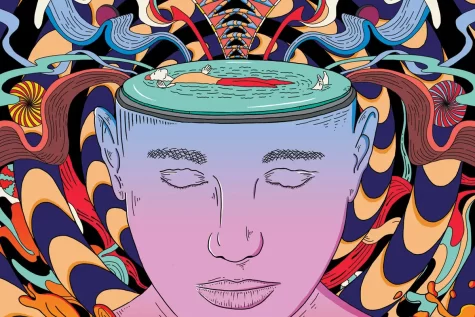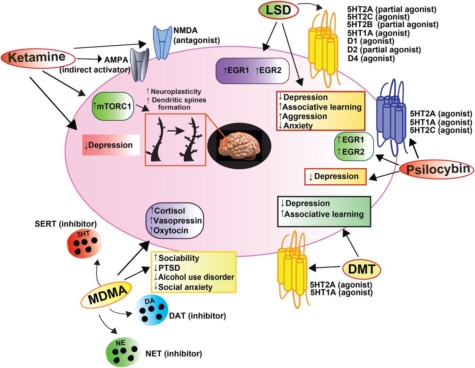
Sophie Rapeepat | Head Editor
November 16, 2023
Hearing the terms “acid,” “ecstasy,” and “shrooms” immediately triggers warning bells in most of our brains. These psychedelics alter a person’s perception of reality and can affect mood and cognitive function. We recognize these as some of the many drugs circulating in our modern world, and rightfully so, as we have become cautious about what they entail.
But their reputation has only recently taken a turn downhill. Psychedelics have been used for centuries in indigenous and ancient cultures for their spiritual experiences and therapeutic results. Research through the mid-20th century found these drugs to be effective in treating mental health illnesses; however, the Counter-Culture movement of the 1960s and the growing popularity of alternative medicine catalyzed an era of push-back from pharmaceutical companies. Since then, most substances, including LSD, MDMA, and Psilocybin, have been labeled as “drugs of abuse” despite their history of recognized medical value.
However, recent studies have shown a revival of interest in the therapeutic potential of psychedelics. Institutions such as Filament Health are pioneering modern methods of anxiety treatment by extracting psilocybin and mescaline, drugs found in natural sources such as mushrooms, cacti, and the iboga plant. As of November 2023, Filament’s CEO Benjamin Lighburn publicly announced new endeavors, stating that his mission is to give people the choice to seek a natural alternative medicine.
“If psychedelics have real potential to help people, I think it’s valuable to encourage more exploration in the field,” stated senior Emily Forester. “It may sound new and scary, but it’s worth a shot and could save lives.”

Research is ongoing, and slow progress is being made for access to medicinal psychedelics. In 2019, the FDA approved a derivative of ketamine known as “esketamine,” a treatment for depression. This milestone marked a turning point for the integration of psychedelics into mainstream healthcare.
As the popularity of these drugs increases, studies continue to show positive results in the treatment of mental illnesses. When used correctly, studies demonstrate the potential of MDMA and LSD to treat conditions such as PTSD, anxiety, depression, and addiction. Researchers believe that the drugs’ ability to promote neuroplasticity and change neural pathways allows patients to confront subconscious thoughts and behaviors.
Senior Elijah Banuelos explained, “I haven’t really heard much at all about psychedelics being used in medicine. Based on the research, it sounds like it might be worth talking about.”
Although these therapeutic results foreshadow an optimistic future for alternative medicine, caution is extremely important when using such powerful treatments. Psychedelics are an evolving field of research and should only be used in medical situations. The history of psychedelics in society is ambivalent, but recent milestones have challenged preconceptions and provided hope for a revolution in mental healthcare.

Leave a Reply